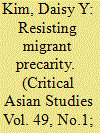| Srl | Item |
| 1 |
ID:
167844


|
|
|
|
|
| Summary/Abstract |
This article investigates the capacity and willingness of women from English-speaking countries, married to Korean men, to integrate into South Korean society, via examination of the expression of national identity in everyday life and the negotiation of relationships across socio-cultural boundaries.
|
|
|
|
|
|
|
|
|
|
|
|
|
|
|
|
| 2 |
ID:
144301


|
|
|
|
|
| Summary/Abstract |
Over the past two decades Korea and Japan have experienced a rapid inflow of foreign population into their homogeneous societies. Despite their many similarities in immigration control policies, Korea and Japan have differed in their politics of immigrant incorporation. Korea's central government has instituted policies that favor female marriage migrants and children of international marriages, while Japan's local governments have initiated policies for a wide range of foreign residents in their communities. I argue that the different boundaries of citizenship for specific groups of the foreign population, created and reinforced by the state, explain variations in the politics of immigrant incorporation policies in the two countries
|
|
|
|
|
|
|
|
|
|
|
|
|
|
|
|
| 3 |
ID:
151730


|
|
|
|
|
| Summary/Abstract |
Since 2006, marriage migrants and their so-called multicultural families have been the recipients of considerable public resources and attention in the Republic of Korea. Thus, it could be said that marriage migrants constitute a relatively privileged group of migrants in South Korea. Yet significant human rights abuses, including domestic and sexual violence, widespread discrimination, and poverty, indicate that marriage migrants continue to face various forms of legal, social, and institutional precarity. By evaluating the specific trajectories by which human rights activists and organizations mobilize in the name of migrant rights, this paper argues that human rights-based activism has not been an effective means of mobilizing resistance to migrant precarity because of its failure to address precarity as a multi-layered and multi-sited reality. In consequence, marriage migrants in South Korea have turned to alternative methods for mobilizing resistance to precarity.
|
|
|
|
|
|
|
|
|
|
|
|
|
|
|
|